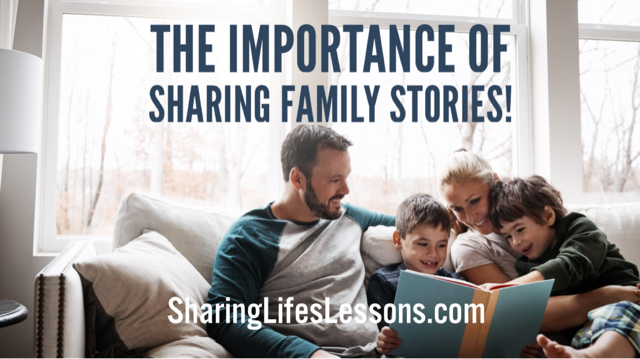
The Importance of Sharing Family Stories
What do you know about your family history? Are there family stories that have been passed down to you from your parents or grandparents? You may wonder why we are asking these questions. It’s because recently we had several occasions where we had the opportunity to share stories about our family.
One time was with a group of first cousins where we reminisced about grandparents and other mutual relatives. We shared memories we had of each other as we were growing up. We also told stories, familiar and unfamiliar to others, about moments in our lives that were embarrassing at the time, but quite humorous now as we reflect on them.
Another time was sharing stories with our daughter about things we experienced when we were young. We had never shared these before. These occasions were wonderful experiences for all of us.
This prompted us to explore the importance of sharing family stories. It’s no surprise that telling family stories is powerful. Yes, it’s a way of preserving family history, but even more important, it creates a sense of resilience and continuity.
Family stories are more than just tales from the past. They help shape our identity and provide a sense of belonging. As Bruce Feiler, author of “The Stories That Bind Us”, explains, “Stories are how we transmit values. Themes give direction and purpose. Stories create community.”
By sharing stories across generations, families can foster connections and pass down traditions. Grandparents reminiscing with grandchildren, parents divulging their own upbringing – these exchanges allow children to gain perspective. They learn about their roots and what mattered most to predecessors. As Feiler notes, this helps kids “understand who they are in the world.”
An interesting study took place in 2001. Sara Duke, a psychologist who worked with kids with learning disabilities, noticed that the students who knew a lot about their families tended to do better when they were faced with challenges. Her husband, Marshall Duke, PhD, a psychologist at Emory University, was intrigued by her observation. To test his wife’s hypothesis, Dr. Duke, along with Robyn Fivush, a colleague, developed a measure called “Do You Know”. The measure asked children to answer 20 questions about their family.
Some examples of questions are: “Do you know where your parents met?” “Do you know the story of your birth?” “Do you know the source of your name?” The researchers then compared the results to a battery of psychological tests the children had taken. Dr. Duke reported, “We were blown away” with the results.
The overwhelming conclusion was, “The more children knew about their family’s history, the stronger their sense of control over their lives, the higher their self-esteem and the more successfully they believed their families functioned.” According to Duke, the single biggest predictor of children’s emotional health and happiness were the results from the Do You Know scale.
With families more fragmented today, maintaining bonds through oral history is key. Even relatives separated geographically can swap tales. Feiler recommends gathering around the phone or computer for “storytime”.
Feiler also suggests not shying away from the ‘wolf’ in sharing family stories. “Just when everything is going wonderfully, along comes the wolf to muck everything up,” Feiler says. “Our instinct as storytellers, and certainly as parents, is to banish the wolf. But if you banish the wolf, you also banish the hero.”
Beyond immediate family, these intergenerational narratives connect us to our culture. Author and folklorist Heather Forest calls storytelling “the thread that binds a society together.” Shared stories, she says, transmit “wisdom, values, history and tradition.” They allow the past to speak to the present.
In our diverse society, hearing different family stories promotes understanding. We recognize shared human experiences crossing boundaries. Or as Feiler puts it, “those voices ultimately become part of you.”
To reap benefits, aim for family story sessions regularly. Let all ages lead, not just elders. Encourage humor and honest reflection. Discuss tales afterward, exploring their larger meaning. Record, when possible, to preserve memories.
The bottom line, according to Feiler, “If you want a happier family, create, refine and retell the story of your family’s positive moments and your ability to bounce back from the difficult ones.”
What about you? What family stories still need to be shared? While the tales themselves matter, it’s also the time together that’s so important. Sharing stories fosters family bonds. As we listen, relate, and reflect, we gain insight into our identity and generational connections. When we pass on personal and cultural narratives, we ensure their valuable life lessons will resonate for generations to come. Happy storytelling!
Chanhassen MN residents, Doug and Lynn Nodland are success coaches and owners of The Balance Center in Excelsior. Contact them at WeCare@SharingLifesLessons.com
© Doug and Lynn Nodland 2024 Articles and videos may be shared in their entirety with attribution.

Recent Comments